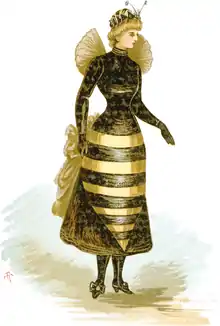déguisement
French

Etymology
déguiser (“to disguise”) + -ment
Pronunciation
- IPA(key): /de.ɡiz.mɑ̃/
Audio (file) Audio (CAN) (file)
Noun
déguisement m (plural déguisements)
- disguise, costume (outfit worn to hide one's identity)
- 2005, Marc-André Wagner, Le cheval dans les croyances germaniques: paganisme, christianisme et traditions [The Horse in Germanic Beliefs: Paganism, Christianity, and Traditions], Honoré Champion, →ISBN:
- Le dernier type est le "cheval-jupon", un terme que l'ethnologue réserve à un déguisement pour une personne, constitué comme suit : le corps de la personne est entouré à la taille par un tissu — le jupon — recouvrant l'essentiel de ses jambes, une tête du cheval en bois […]
- The last type is the "hobby horse", a term which Ethnologue reserves for a disguise for a person, made as follows: the body of the person is surrounded at the waist by a cloth — the skirt — covering most of his legs; a horse's head of wood […]
-
- camouflage
- fancy dress
- une fête à déguisements ― A fancy-dress party
Further reading
- “déguisement”, in Trésor de la langue française informatisé [Digitized Treasury of the French Language], 2012.